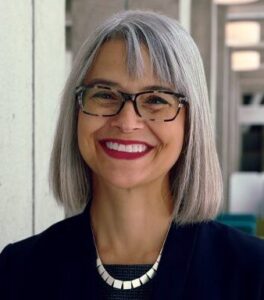Director's Letter

Liz Cole, Director
Welcome to the National Center for Institutional Diversity (NCID)!
Since our founding in 2005, in response to the landmark US Supreme Court cases Grutter v. Bollinger and Gratz v. Bollinger, the NCID has remained committed to advancing diversity, equity, and inclusion (DEI) in higher education and society at large. These cases challenged U-M's affirmative action policies and highlighted the need to ensure higher education institutions are accessible to students of all backgrounds. The NCID was created to meet this challenge, evolving into a hub of action-oriented scholarship that fosters solutions to real-world issues.
Our Work and Impact
At the NCID, we take a collaborative approach to applying DEI knowledge in ways that transform both academia and society. Our programs are designed to connect and empower scholars who are committed to addressing today’s most pressing challenges.
For example, the Anti-Racism Collaborative supports scholars in research and initiatives aimed at dismantling systemic racism. Through grants, networking, and other resources, this collaborative helps bring together those who are actively working to create sustainable, anti-racist outcomes in their fields.
Beyond U-M, our Diversity Scholars Network connects over 1,300 researchers from 500+ institutions globally. These scholars are engaged in cutting-edge work that spans education, policy, health, and more. Through the DSN, members collaborate across disciplines and borders to amplify their collective impact on social justice issues.
Applying Diversity Scholarship to Increase Equity
Our commitment to driving change is exemplified through the CASCaDE project (Change Agents Shaping Campus Diversity and Equity) funded by the Bill and Melinda Gates Foundation. CASCaDE is developing an open-access toolkit to equip faculty and staff to lead DEI efforts on their campuses. By democratizing access to resources, we empower higher education professionals to improve outcomes for underrepresented minority students and build more inclusive environments for all. This is just one example of CASCaDE’s support for faculty and staff as positive change agents on their campuses.
Continuing our commitment to positive transformation, the Collegiate Fellowship Program, a collaborative program within U-M’s College of Literature, Science, and the Arts (LSA), plays a crucial role in preparing faculty whose work is directly tied to advancing diversity and equity in higher education. This program recruits extraordinary scholars—as judged by their departments—whose research, teaching, and/or service contribute to diversity and equal opportunity in higher education. We support their careers by providing mentorship, community-building, and professional growth opportunities.
Accounting for inequity's historic roots, the Inclusive History Project (IHP) is a U-M presidential initiative designed to study and document a comprehensive history of the University of Michigan that is attentive to diversity, equity, and inclusion, and stretches across the University’s three campuses, as well as Michigan Medicine. Centering repair in all that they do, the IHP engages the campuses and the communities that surround them through programming, supporting teaching about U-M’s histories, and offering opportunities for students and community members to participate in historical research. In this journey of institutional self-discovery, U-M commits to changing our conception of the past and to taking action to build a truly inclusive present and future.
Recognizing Leadership in DEI
We are proud to celebrate those who have made extraordinary contributions to DEI scholarship. The James S. Jackson Distinguished Career Award for Diversity Scholarship recognizes senior faculty who have had an outstanding impact on the world's understanding of DEI issues. This award honors both research and public engagement, reinforcing the power of knowledge to drive societal change.
Similarly, the University Diversity & Social Transformation Professorship highlights senior faculty members who have demonstrated a long-term commitment to advancing DEI in their scholarship, teaching, and/or service. These individuals not only transform the University of Michigan but also shape the broader societal discourse around inclusion and equity.
Thought Leadership and Knowledge Sharing
Our publication, Spark Magazine, bridges the gap between scholarly research and public discourse. Through timely, accessible essays on key social issues, we provide readers with the knowledge they need to make informed decisions that affect their communities. Whether addressing topics like immigration, healthcare disparities, or climate justice, Spark fuels informed discussions and policy-making.
In addition, our webinar series offers timely discussions on DEI’s most urgent issues. For the 2024-2025 academic year, we are focusing on the theme of belonging, exploring how identities intersect with institutional inclusion and social justice. These conversations, featuring globally recognized scholars, offer practical insights into applying DEI knowledge to real-world challenges.
Looking Forward
Our mission is clear: to foster an inclusive society through scholarship, collaboration, and action. We remain dedicated to empowering those who apply DEI knowledge to create tangible social transformations. We invite you to engage with our programs, share ideas, and collaborate with us to drive forward impactful change.
Warm regards,
Liz Cole
Director, NCID
University Diversity and Social Transformation Professor of Psychology and Women’s and Gender Studies
